- Home
- James Luceno
Star Wars - Cloak Of Deception Page 8
Star Wars - Cloak Of Deception Read online
Page 8
you are, Senator?" Palpatine shrugged. "Consider it a personal flaw." Argente
nodded soberly. "I'll remember that." "So tell us," Toora said, "is the
Supreme Chancellor embarking on a dangerous course by taking on the Trade
Federation?" "The danger is that he sees only half the picture," Palpatine
began. "Though he would be the first to deny it, Valorum is essentially a
bureaucrat at heart, just as his ancestors were.
He favors rules and procedure over direct action. He lacks judgment. The
Valorum dynasty was largely responsible for granting the Trade Federation free
rein decades ago. How do you think they accumulated their vast holdings?
Certainly not by favoring the outer systems. But by making gainful deals
with the InterGalactic Bank Clan and corporations like TaggeCo. That this
latest crisis should revolve around the Nebula Front is especially ironic,
since Valorum's father had an opportunity to eradicate the group, and he
failed, chastising them rather than disbanding them." "You surprise me,
Senator," Toora said.
"In a good way, I think. Do go on." Palpatine crossed his legs and sat
tall in his chair. "The Supreme Chancellor fails to grasp that the future of
the Republic very much depends on what occurs in the Mid and Outer Rims. As
corrupt as Coruscant has become, the real corrosion--the sort that can
eventually eat away at the center--always begins on the edges. It progresses
from the outside in.
"Unless Valorum does something to stay the tide, Coruscant itself will
someday be a slave to those systems, unable to enact any legislation without
their consent. Unless we placate them now, we'll be forced to bring them under
central authority at some later date. They are the key to the survival of the
Republic." Taa huffed. "Unless I misread you, you're saying that the Trade
Federation is our link with those systems - comCoruscant's ambassador, if you
will--and that therefore we can't afford to alienate the Neimoidians and the
rest." "You are misreading me," Palpatine said firmly.
"The Trade Federation needs to be brought under control. Valorum is
correct to push for taxation, because the Trade Federation already has too
much influence in the outlying sectors. Desperate to conduct trade with the
Core, hundreds of outer systems have joined the Federation as signatory
members, yielding their rights to individual representation in the senate.
At the moment, the Neimoidians and their partners lack enough votes to
block taxation. But in a year, in two years, they could have adequate backing
to overrule the senate at every opportunity." "Then you'll stand with Valorum,
" Toora said.
"You'll support taxation." "Not yet," Palpatine said carefully. "He views
taxation as a means of punishing the Trade Federation and, at the same time,
of enriching Coruscant--an approach that will alienate not only the Trade
Federation members, but also the outlying systems. Before I cast Naboo's
support with one side or the other, I want to see how the votes stack up. Just
now, those who hold the middle ground stand to reap the most. Those who see
all sides clearly will be in the best position to guide the Republic through
this critical transition. If Valorum has sufficient support without the
backing of my sector, so much the better. But I won't flinch in my obligation
to do what is ultimately best for the general good." "Spoken like a future
party whip," Taa said, with a guffaw.
"Indeed," Argente said, in all seriousness.
Toora appraised Palpatine openly. "A few more questions, if you wouldn't
mind." Palpatine gestured toward the stage. "While I'd be glad to discuss
these matters at greater length, the performance is about to begin." Outfitted
in lackluster tunics and soft boots, the Jedi students stood in two opposing
lines, two dozen lightsabers ignited in brilliant cast, raised in twice as
many hands.
At a word from the lightsaber Master, the twelve students comprising one
line took three backward steps in unison and set themselves in defensive
postures--feet planted wide and lightsabers held straight out from their
midsections.
Custom-built by each student, to suit hands of varying size and
dexterousness, no two of the lightsabers were alike, though they did share
some features in common charging ports, blade projection plates, actuators,
diatium power cells, and the rare and remarkable Adegan crystals that gave
birth to the blade itself. There were few known materials in the galaxy that a
lightsaber could not cut. Fully powered, and in the right hands, a lightsaber
could cleave duracrete or burn its way slowly though a starship's durasteel
blast doors.
At the next word from the Master, the second line set themselves in
attack stances, giving their shoulders a quarter turn, lowering their center
of gravity by bending slightly at the knees, and raising their lightsabers in
two-fisted grips, as if to swat a pitched ball.
At the instructor's final word, the second line advanced in earnest. The
students in the first line set their lightsabers to defend and, with
choreographed precision, retreated purposefully as they allowed their
opponents to hammer repeatedly at their elevated blades.
When the defenders had been driven halfway across the room, the
lightsaber Master called the exercise to a halt and had the groups reverse
positions.
Now it was those who had defended who attacked, the blades of light
thrumming and grating riotously against one another, auras merging, filling
the air of the training room with blinding flashes of illumination.
Qui-Gon and Obi-Wan watched from an observation gallery set slightly
above the room's padded floor, deep within the pyramid that was the Jedi
Temple's towering base. The exercise had been going on all morning, but only a
few of the students showed signs of fatigue.
"I can remember this like yesterday," Obi-Wan said.
Qui-Gon quirked a smile. "It's a good deal of yesterdays for me, Padawan.
" Though separated by more than a score of years, they had both passed their
youths in the Temple, as was the case with all Jedi, whether students,
Padawans, Jedi Knights, or Masters. The Force revealed itself in infancy, and
most potential Jedi were residents of the Temple by the age of six months,
either discovered on Coruscant or distant worlds by full-fledged Jedi, or
delivered to the Temple by family members. Tests were frequently used to
establish the relative vitality of the Force residing in candidates, but those
tests didn't necessarily forecast where a candidate might end up; whether he
or she, human or alien, might take up the lightsaber in defense of peace and
justice, or pass a lifetime of service in the Agricultural Corps, helping to
feed the galaxy's poor or deprived.
"As often as I trained, I always worried that I lacked the temperament to
become a Padawan, let alone a Jedi Knight," Obi-Wan added. "I fought harder
than anyone to mask my self-doubt." Qui-Gon glanced at him askance, his arms
folded. "If you had fought a bit harder, Padawan, you surely would have
remained in th
e Agricultural Corps. It was when you stopped trying so hard
that you found your path." "I couldn't keep my mind in the moment." "And you
still can't." Twelve years earlier, Obi-Wan had been assigned to the
Agricultural Corps on the planet Bandomeer, and it was there that he had
formed a connection with Qui-Gon, whose previous Padawan had fallen to the
dark side of the Force and left the Jedi Order. But despite the bond he and
Qui-Gon had formed, there were times when he wondered if he had the makings of
a Jedi Knight.
"How do I know that the Agricultural Corps wasn't my intended path,
Master? Perhaps our meeting on Bandomeer was a fork in the path I shouldn't
have taken." Qui-Gon finally turned to him. "There are many paths to take,
Obi-Wan. Not all of us are fortunate enough to find the one with heart, the
path the Force has set before us. What do you find when you search your
feelings about the choices you have made?" "I feel that I've found the right
path, Master." "I agree." Qui-Gon clapped Obi-Wan on the shoulders, then
smiled as he turned to regard the students. "Even so, I think you would have
made a good field hand." The students were kneeling in two rows, legs tucked
underneath, with feet crossed behind them. The room was still, save for the
sound of the lightsaber Master's bare feet adhering to the floor mat as he
sauntered between the two rows, appraising each of his students.
A Twi'lek, with slender head-tails and a heavily muscled upper body, his
name was Anoon Bondara, a duelist of unparalleled skill. Qui-Gon engaged him
in matches at every opportunity. For a match with Bondara, no matter how
brief, was more instructive than twenty contests against lesser opponents.
The lightsaber Master stopped in front of a female human student named
Darsha Assant, who happened also to be his Padawan. Bondara squatted down on
his haunches to regard her at eye level.
"What were you thinking when you attacked?" "What was I thinking, Master?
" "What was in your thoughts? What was your intent?" "Merely to be as forceful
as possible, Master." "You wanted to win." "Not to win, Master. I wanted to
strike impeccably." Bondara made a face. "Rid yourself of thinking.
Don't expect to win; don't expect to lose.
Expect nothing." Obi-Wan glanced at Qui-Gon. "Now where have I heard that
before?" Qui-Gon shushed him, without taking his eyes from Bondara, who was in
motion once more.
"The lightsaber is not a weapon with which to vanquish foes or rivals,"
Bondara said. "With it, you destroy your own greed, anger, and folly. The
forger and wielder of a lightsaber must live in such a manner as to represent
the annihilation of anything that impedes the path of justice and peace." He
stopped and glanced at everyone. "Do you understand?" "Yes, Master," They
replied in one voice.
Bondara clapped his hands together loudly. "No, you don't.
You must learn to hold the lightsaber by loosening your grip on it. You
must learn to advance rhythmically so that you will learn to produce formless
rhythms. Do you understand?" "Yes, Master," they replied.
"No, you don't." He scowled and sat down at the end of the rows. "I will
tell you a story.
"A human, wrongly accused of a crime, was being transported by
repulsorlift vehicle across the desert wastes of a remote world, to a prison,
located even deeper in the wastes. Without warning, the vehicle experienced a
malfunction directly over a pit that was, in fact, the huge and ravenous mouth
of a creature that inhabited the wastes.
"The sudden malfunction catapulted the human's escorts down into the
mucus-coated maw of the creature. The human was also thrown from his perch.
But at the last instant he was able to grab on to the vehicle's landing strut.
Not with hands, however- - for they were shackled in stun cuffs behind him--
but with his teeth.
"Shortly a caravan of travelers happened by.
Lost and hungry, the travelers inquired to know the whereabouts of the
closest settlement, so they might replenish their meager stores.
"The human found himself in a quandary. By failing to respond, he
understood that he might be sentencing the lost travelers to certain death in
the sand wastes. But merely by opening his mouth and uttering a word, he would
be sentencing himself to certain death in the digestive tract of the sand
creature." Bondara paused. "Under such circumstances, what must the human do?"
The students knew in advance that they were not likely to hear the answer from
Anoon Bondara.
Getting to his feet, the lightsaber Master added, "I will hear your
responses tomorrow." The students bowed at the waist and kept their foreheads
to the mat until Bondara had left the room. Then they rose, eager to compare
opinions of the training session, though not a one spoke of possible solutions
to the instructor's thought-puzzle.
Qui-Gon tapped Obi-Wan on the shoulder.
"Come, Padawan, there's someone I wish to speak with." Obi-Wan trailed
him down the steps and onto the soft floor. There, several Jedi Masters were
conferring with their Padawans. Obi-Wan knew some of the Masters slightly, but
the person Qui-Gon steered them toward was not someone he had ever met.
She was perhaps one of the most exotic women Obi-Wan had ever seen. Her
eyes were oblique and widely spaced, with large blue irises that seemed to
favor her upper lids. Her nose was broad and flat, and her skin was the color
of fruitwood.
"Obi-Wan, I want you to meet Master Luminara Unduli." "Master Jinn," the
woman said, taken by surprise, and inclining her head in a bow of respect.
Qui-Gon returned the gesture. "Luminara, this is Obi-Wan Kenobi, my
Padawan." She bowed her head to Obi-Wan, as well. Her face was triangular in
shape, and the lower portion was tattooed in small diamond shapes that formed
a vertical stripe from her lush, blue - black lower lip to the tip of her
round chin. The backs of her hands also bore tattoos, atop each knuckle joint.
Qui-Gon's expression became serious.
"Luminara, Obi-Wan and I have had a recent encounter with someone who
bears markings similar to yours." "Arwen Cohl," Luminara said before Qui-Gon
could go on. She smiled faintly. "Had I grown up on my homeworld and not in
the Temple, I'm certain I would have heard tales of Arwen Cohl throughout my
youth." She met Qui-Gon?ness curious gaze. "He was a freedom fighter, a hero
to our people during a war fought with a neighboring world. He was a great
warrior, and he made many sacrifices. But soon after our people won their
freedom, he was accused of being a conspirator by the very people on whose
side he had fought.
That was their way of assuring that Cohl would not be elevated to the
position of authority our people wished him to assume. He spent many years in
prison, subjected to cruel punishments and harsh conditions, and those further
hardened a man who already had been hardened by war.
"When he left those conditions--whichenough he escaped that awful place,
with the help of some of his former confederates--he avenged himself on those
who did him wrong,
and he swore that he would have nothing more to do with the
world that he had fought so hard to liberate.
"He became a mercenary, boasting openly that he would never make the
mistakes he had once made. That he now understood the nature of the cosmos,
and would always be one step ahead of those who would seek to bring him down,
capture him, or in any way thwart him." Qui-Gon inhaled through his nose. "Did
he bear any special grudge against the Trade Federation?" Luminara shook her
head. "No more than anyone else in my home system. The Trade Federation
brought us into the Republic, though they did so at the expense of my world's
resources.
"In the beginning, Arwen Cohl would hire himself out only to those whose
cause he felt was justified. But over time--noto doubt because of the blood he
shed--he became nothing more than a pirate and a contract killer. He was said
never to have betrayed a friend or an ally." She paused for a moment, then
added, "It is regrettable that history will remember the criminal Cohl rather
than the exemplary Cohl. I was sad to hear that he had perished at Dorvalla."
When Qui-Gon didn't respond, Luminara asked, "Did he not?" Qui-Gon appeared
preoccupied. "For now, I'll grant that he vanished at Dorvalla." Luminara
nodded uncertainly. "Whether Cohl is dead or alive, the matter is in the hands
of the Judicial Department, is it not?" Again, Qui-Gon took a moment to
respond.
"All that is certain is that Cohl's destiny is in hands other than mine."
c arbon scored and blistered by the explosion that had sundered the freighter,
an arc of the Revenue's starboard hangar arm hung over Dorvalla's wan polar
cap. Just outside the reach of the planet's shadow, the great curve of
durasteel appeared to have been there forever. Perpetual sunlight poured in
through the main hangar portal--where the arm's hand might have been- -
illuminating a shambles of cargo pods and barges.
Affixed like a barnacle to the inner hull, however, sat a lone battered
shuttle. Inside the shuttle, and even the worse for wear, sat her crew of
eight.
"I'm still waiting for that pardon you promised," Cohl said to Rella.
She shot him a look. "If and when you get us out of this, and not a
moment before." They were each in their chairs, as were the others, some of

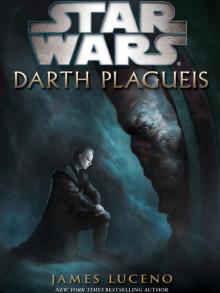 Darth Plagueis
Darth Plagueis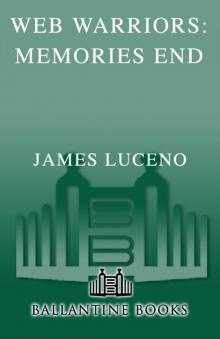 Memories End
Memories End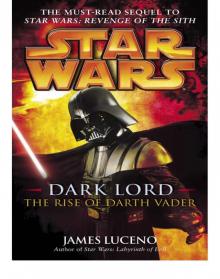 Star Wars: Dark Lord: The Rise of Darth Vader
Star Wars: Dark Lord: The Rise of Darth Vader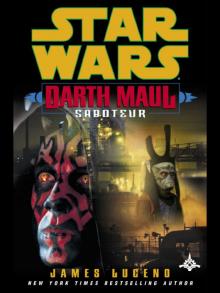 Star Wars Darth Maul: Saboteur
Star Wars Darth Maul: Saboteur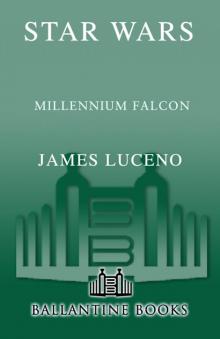 Star Wars: Millennium Falcon
Star Wars: Millennium Falcon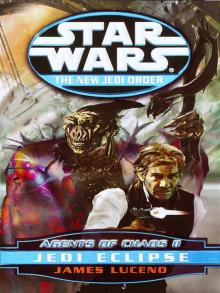 Jedi Eclipse
Jedi Eclipse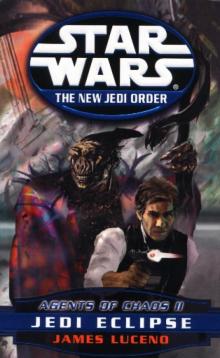 Star Wars The New Jedi Order - Agents of Chaos II - Jedi Eclipse - Book 5
Star Wars The New Jedi Order - Agents of Chaos II - Jedi Eclipse - Book 5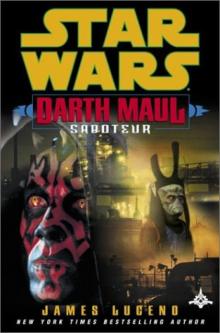 Star Wars - Darth Maul - Saboteur
Star Wars - Darth Maul - Saboteur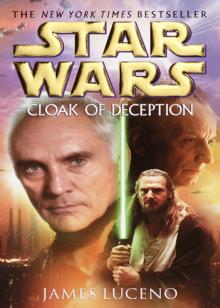 Star Wars: Cloak of Deception
Star Wars: Cloak of Deception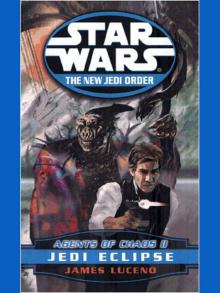 Star Wars: New Jedi Order: Agents of Chaos II: Jedi Eclipse
Star Wars: New Jedi Order: Agents of Chaos II: Jedi Eclipse End Game
End Game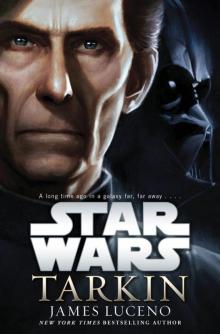 Tarkin: Star Wars
Tarkin: Star Wars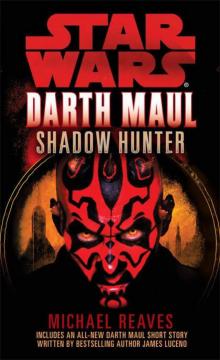 Restraint
Restraint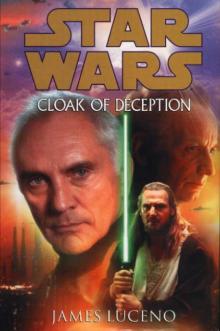 Star Wars - Cloak Of Deception
Star Wars - Cloak Of Deception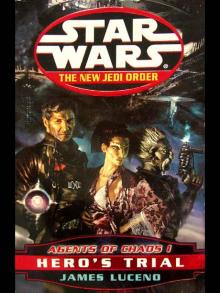 Star Wars: New Jedi Order: Agents of Chaos I: Hero's Trial
Star Wars: New Jedi Order: Agents of Chaos I: Hero's Trial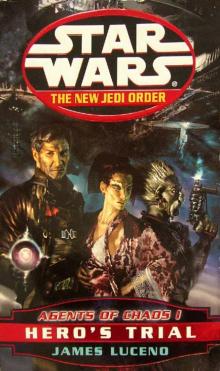 Star Wars The New Jedi Order - Hero's Trial - Book 4
Star Wars The New Jedi Order - Hero's Trial - Book 4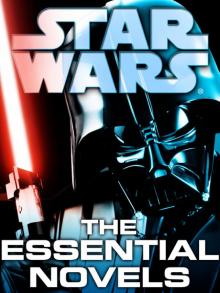 The Essential Novels
The Essential Novels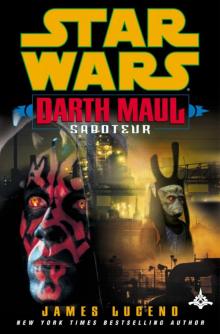 Darth Maul: Saboteur
Darth Maul: Saboteur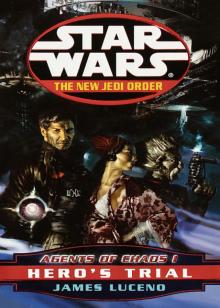 Hero's Trial: Agents of Chaos I
Hero's Trial: Agents of Chaos I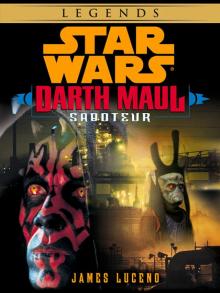 Saboteur
Saboteur The Unifying Force
The Unifying Force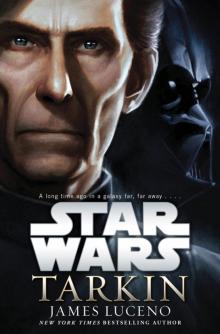 Tarkin
Tarkin Dark Lord : The Rise of Darth Vader
Dark Lord : The Rise of Darth Vader Catalyst
Catalyst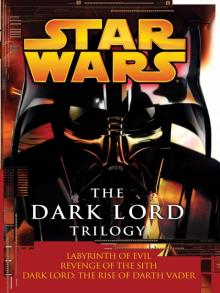 Book 0 - The Dark Lord Trilogy
Book 0 - The Dark Lord Trilogy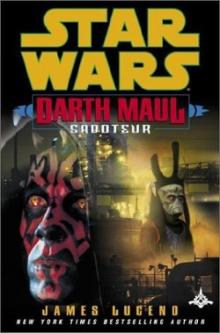 Darth Maul: Saboteur (star wars)
Darth Maul: Saboteur (star wars)